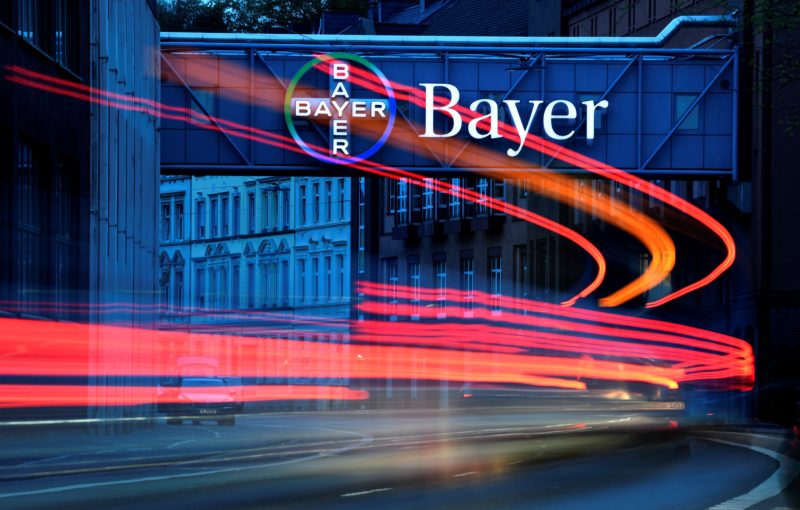Monsanto merger pumps up Bayer profits in 2019
Bayer’s profit jumped thanks it its acquisition of Monsanto, but it did not report setting aside any money for the legal drama surrounding a flagship weedkiller that is alleged to have caused cancer (INA FASSBENDER)
Frankfurt am Main (AFP) – The acquisition of seeds and pesticides maker Monsanto remained both boon and burden for German chemical and pharma giant Bayer in 2019, ensuring bumper profits but miring the company in tens of thousands of legal disputes over a key weedkiller.
“We met our financial goals, even though we had to battle a difficult market environment, especially in the agricultural sector,” chief executive Werner Baumann said Thursday as he presented Bayer’s annual results.
Net profit leaped 141 percent year-on-year, to 4.1 billion euros ($4.5 billion), beating forecasts from analysts surveyed by Factset.
Much of the effect was down to the full integration of Monsanto into Bayer’s business after the mid-2018 takeover.
Operating profit at the group’s crop science unit jumped 80 percent.
But Bayer also reported it had been served with around 48,600 American lawsuits — up from 42,700 in October — over Monsanto weedkiller glyphosate, a vital ingredient in widely-used products like Roundup.
Plaintiffs argue glyphosate caused their cancers, but Bayer insists the science shows its chemical is safe and is “vigorously” appealing first-instance court decisions against it.
“If necessary, we will appeal through every court,” chief executive Baumann said, noting that the US Environmental Protection Agency in January reiterated its judgement that glyphosate presents no health risks.
Bayer did not report setting any cash aside in provisions to cover potential court-ordered payouts or a settlement in the glyphosate cases, which analysts have reckoned at up to $20 billion.
The group is in court-ordered mediation talks with plaintiffs and bosses “want to reach as far as possible a solution that closes this issue for good,” Baumann said.
He would not be drawn on how much a settlement might cost, or on media reports it could include an end to sales of Roundup to private individuals.
The group also plans to appeal a court ruling that its herbicide dicamba destroyed a US farmer’s peach orchards, one of 140 lawsuits pending in America over the chemical.
– Chairman quits early –
In a separate press release, Bayer said it would publish expert legal opinions on its acquisition of Monsanto and bosses’ judgements of the associated risks, in response to shareholder pressure.
The group suffered an unprecedented slap when investors voted against executives at last year’s annual shareholder meeting.
On Wednesday Bayer had announced that supervisory board chairman Werner Wenning will step down early.
The 73-year-old, who was chief executive until 2010, was seen as a key backer of the Monsanto merger and mentor to present CEO Baumann.
– Trade war headwinds –
North America was the focus of headwinds for Bayer’s agriculture business in 2019, as falling acreage of soybeans, competition, adverse weather and trade conflicts weighed on revenues.
Worldwide, sales were down slightly on 2018 when presented as if Monsanto had been part of the business since January 1 that year.
Aside from the US, drought in Australia and African swine fever weighed on business, finance director Wolfgang Nickl said, while Latin America was a bright spot.
Elsewhere in the business, operating profit grew in pharmaceuticals “driven by higher volumes and a decrease in the cost of goods sold”, notably in China.
Pharma chief Stefan Oelrich said Bayer had “a large number of new products” in development and trials to replace its two revenue workhorses, anticoagulant Xarelto and eye medication Eylea, whose patents will expire in the coming years.
Meanwhile profit was flat at the group’s over-the-counter medicines unit despite rising sales.
– Coronavirus impact uncertain –
Looking ahead to 2020, Bayer said it expected to increase revenue from 2019’s 43.5 billion euros by “about 3 to 4 percent” to between 44 and 45 billion, adjusting for currency and portfolio effects.
Earnings per share should grow to between 7.00 and 7.20 euros, also in adjusted terms, up from 6.40 last year.
Finance chief Nickl said Bayer had donated medicines in China to help combat the coronavirus disease outbreak, but added that “we will only be able to estimate the impact on our business after the end of the first quarter”.
Disclaimer: Validity of the above story is for 7 Days from original date of publishing. Source: AFP.


